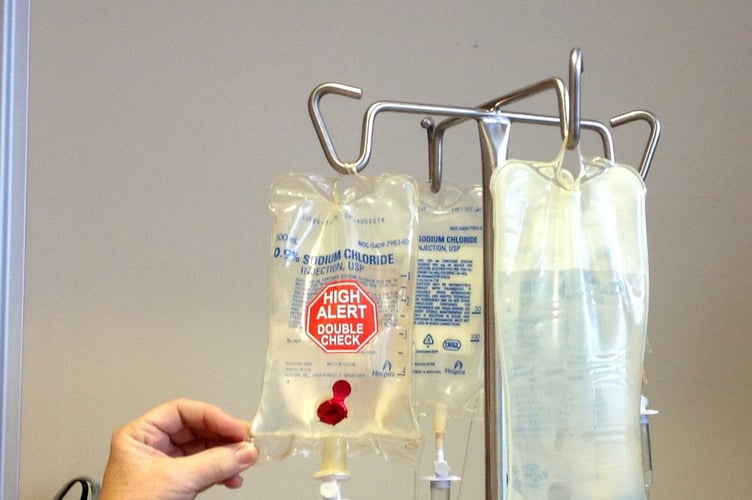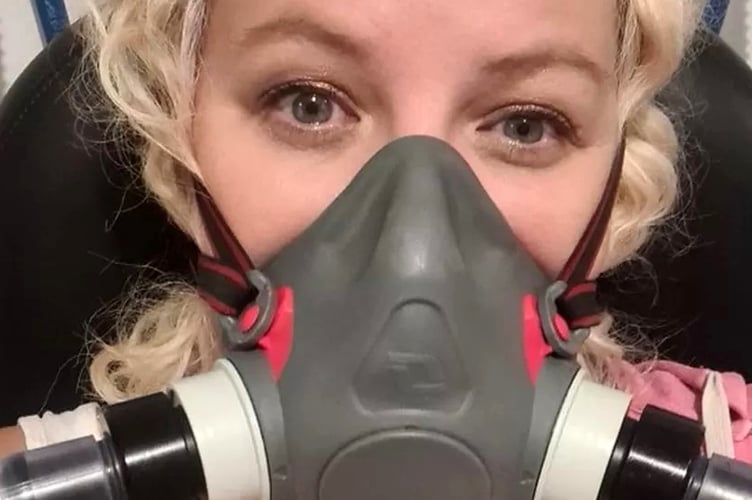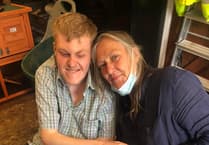More patients with cancer are waiting longer for treatment – a clear sign that the cancer care system in Wales is at breaking point.
And despite Welsh Government promises that three quarters of those with cancer should begin treatment within 62 days of their diagnosis, the waiting list for first treatments is actually growing.
The latest data shows that nearly 800 people were added to the list of those waiting to receive their first treatment in July.
Across Wales that month, only 56.6 per cent of people with cancer received their treatment on time. That figure is well below both current targets of 75 per cent, as well as the Welsh Government’s ambition of treating 80 per cent of people in time by 2026.
And depending on the type of cancer a patient has, that figure of 56.6 per cent, falls below 40 per cent.

Macmillan Cancer Support says the system is at breaking point, and it warns that Wales’ current target of treating 75 per cent of people with cancer on time remains a target that has never been met – a fact which is leaving cancer patients to face devastating waits for potentially life-saving treatment.
Local news teams from Tindle Newspapers across mid Wales look a look at the statistics that paint a frustrating picture for those waiting for life-saving treatments.
The Tenby Observer spoke to one patient from Pembroke Dock recently diagnosed with bowel cancer.
“I was told that I wouldn’t get an appointment for eight months,” she said.
The patient, a former nurse with Hywel Dda Health Board, asked not to be identified in case speaking out might cause issues when it comes to being seen by doctors.
“Because I know my way around the system, I was eventually able to push and push and managed to secure a referral to Cardiff,” she said. “Instead of eight months, I’m being seen in six weeks, which isn’t great but it is at least better knowing that the treatment can start sooner.
“Everyone knows that getting treatment early is key to a good outcome against most cancers. They’re playing life and death with my and other cancer patients’ lives.”
Sadly, it’s a story that’s all too common.
Macmillan is now calling for urgent action to support both hard-working NHS staff and the people they care for – not least the need to fund and train more specialist cancer roles to help manage the growing demand for cancer care in Wales.

Responding to the latest cancer treatment waiting times data, Glenn Page, Macmillan policy manager for Wales said: “While any improvement in cancer treatment waiting times is welcome, the data still shows that in July, as in every other month over the last two years, the Welsh Government has failed to meet targets for treating people with cancer on time.
“The figures show a cancer care system that is unsustainable and at breaking point, with people living with cancer facing devastating delays and being let down by the very systems designed to support them.
“People recently diagnosed with cancer, and the tireless NHS staff who care for them, know all too well that cancer treatment is time critical.
“Both patients and exhausted NHS professionals will now quite rightly look towards the targets set by the Welsh Government and ask, ‘what are we waiting for?’ Urgent action must be taken to ensure people with cancer can get the timely, high-quality care they need.”
In July only 56.6 per cent (1,025 out of 1,812) of pathways started their first definitive treatment within 62 days of first being suspected of cancer. This was 3.2 percentage points higher than the previous month, 0.9 percentage points higher than July 2022 and the highest since March 2023.
In July, 1,812 pathways where the patient was newly diagnosed with cancer started their first definitive treatment in the month. This was a decrease of 3.6 per cent compared to the previous month.
At least 75 per cent of patients should start treatment within 62 days (without suspensions) of first being suspected of cancer. Data published for time periods before December 2020 are not subject to the target.
The Welsh Government’s planned care recovery plan established a new target of 80 per cent, to be reached by 2026.
None of the targets have ever been met.
There is also an interim recovery target that cancer diagnosis and treatment would be undertaken within 62 days for 70 per cent of people by March 2023 that has also been missed.
For some cancer types, performance remains even more concerning. For example, only 34.5 per cent of people with urological cancer – around one in three – started their treatment on time.

Mother-of-two Ailsa Guard, from Swansea, has gone public about her struggle with deteriorating mental health as she was pushed to the her limits as she waited seven months from the point of an initial suspicion of breast cancer in November 2021 to beginning her treatment.
“I just went into a bit of a meltdown, thinking I’m going to die from this because I don’t know how long this has been in my system,” she said.
She found a lump under her arm and her family doctor referred her for a scan in mid December.
That initial scan proved inconclusive. A follow-up scan was more definitive, and in early February last year she was diagnosed with breast cancer.
“I naively thought you get told you have cancer and things are done really quickly,” she said.
She eventually started chemotherapy in June 2022.
She told the Cambrian News that her children paid for her to have a private scan that cost £600 to try and speed things up.
Dealing with the NHS system was also exceedingly frustrating in that she was shuffled from one department to another as she waited for treatment.
“I’m a completely different person coming out of it the other side. It’s been one of the most horrendous, draining periods of my life.”
“In the beginning it was the delays that changed me a lot. That started the anxiety off in me – I felt like I was in a little box screaming and no one was listening to me. I was having to chase things.”
A year on from first finding the lump, she has had five months of chemotherapy, has just finished a course of radiotherapy and is on a new drug. Thankfully, things are looking good and she had follow-up blood appointment monthly and regular scans
Elin Jones, Ceredigion MS and Llywydd of the Senedd, told the Cambrian News: “It’s disappointing to hear that cancer patients are still facing such a long wait to start their treatments, at what must be a very distressing time, where any wait in receiving information and treatment must feel like a lifetime.
“I’ve already made the case to the health minister that Bronglais Hospital in Aberystwyth needs to be considered as a rapid diagnosis centre in line with the £86 million investment in new cancer diagnostic and treatment facilities announced this year by the Welsh Government.
“For Ceredigion and mid Wales residents, the nearest rapid diagnosis centre is Llanelli.
of cancer patients in July started their treatments within the 62-day goal set by the Welsh Government
of cancer patients in June started their treatments within the 62-day goal set by the Welsh Government
“These statistics published on current treatment waiting times, makes case the need for a rapid diagnosis centre in Bronglais even more pressing.”
Paul Davies, MS for Preseli, told the Tenby Observer: “It’s really worrying that the latest data shows only 56.6 per cent of people with cancer received their treatment on time in July.
“Behind these figures are real people waiting for treatment and I know from personal experience just how time sensitive it is to receive cancer treatment.
“The Welsh Government must urgently prioritise this issue and work with health boards to improve cancer treatment waiting times so that patients can receive the treatment they need as soon as possible.”
Mabon ap Gwynfor, MS for Dwyfor Meirionnydd and Plaid Cymru’s spokesperson for health and social care said, told the Cambrian News: “Cancer continues to be the single biggest cause of death in Wales, and we know that the sooner it is detected the better the outcomes. So, the fact that we are seeing increased delays in waiting times is a matter of serious concern.
“There are many reasons why this is happening, but fundamentally the Labour government must get to grips with the lack of staff, both in recruiting new staff but maybe more importantly in retaining current staff.
“That means improving terms and conditions and ensuring they opportunities to train and enhance their skills.
“The minister has made a point of saying that people need to take responsibility for their health, but this patronising approach denies the clear link between ill health and poverty.
“We know that there are huge cancer inequalities in Wales, where people living in the most deprived areas are more likely to get cancer. So, if we are to tackle cancer rates then we also need to tackle poverty and deprivation.
“Lung cancer remains stubbornly high in Wales with almost half of the people with lung cancer being diagnosed at the latest stage. Screening for lung cancer can find the disease early on, even when those with it don’t realise that they might suffer from it, yet the Labour Government don’t have a targeted screening programme for lung cancer.
“This needs to be introduced sooner rather than later and would help save many lives.
“On a personal note I’d like to thank Macmillan for all that they have done to help patients and families, including my own, during extremely difficult times. They literally save lives, and my gratitude to them is eternal.”




